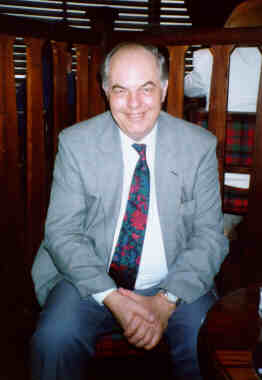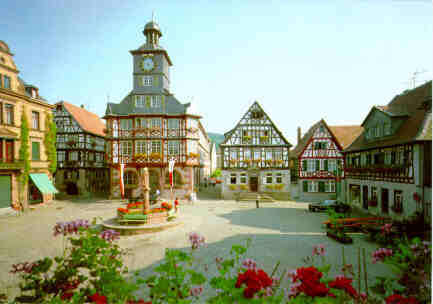

|
When Professor Arthur Pollard and I were lecturers in English at the University of Manchester, he asked me to help him collect and edit the letters of Elizabeth Gaskell, then known for little more than her Cranford and The Life of Charlotte Brontë, despite the sterling efforts of overseas pioneers like Aina Rubenius in 1950 and A. B. Hopkins in 1952. The letters - vital, perceptive and amusing records of her busy life - justified Professor Pollard's confidence in their quality. They proved to be an immense success after their publication by Manchester University Press in 1966, introducing readers to one of the most attractive personalities of the Victorian age as well as providing multiple insights into the social history of her times.
A few years later the dynamic Mrs Joan Leach of Knutsford initiated The Gaskell Society, which holds regular meetings during the year. Similar programmes are now run by two daughter branches, for London & South-East and for the South-West of England. The Society also mounts weekend conferences - at Scarborough, Ambleside, Edinburgh, Oxford, Chester and London to date, with Bath to come. We have followed in Elizabeth Gaskell's footsteps abroad, visiting Heidelberg and Heppenheim, Paris, Antwerp and Brussels. (Rome now begins to exert its magical influence.) In all these activities, the Society has been able to draw upon the knowledge and expertise of its members as well as benefit from the brilliance of numerous guest speakers. As President of the British Gaskell Society I am gratified to find that not only our British and American branches are flourishing, but also the Gaskell Society of Japan is truly established (President: Professor Yuriko Yamawaki). Several fine books on Gaskell by Americans and edited translations of her works by Japanese scholar-critics are particularly noteworthy. The very fact that I am able to send these greetings through Mitsu Matsuoka's splendid command of the Internet is another sign that Elizabeth Gaskell has achieved international recognition. I should not fail to mention a number of translations into Italian and papers in major journals like Professor Francesco Marroni's Rivista di Studi Vittoriani from the University at Pescara, Italy. In 1986 Joan Leach established The Gaskell Society Newsletter, and in 1987 The Gaskell Society Journal commenced under the editorship of Alan Shelston. It has gone from strength to strength, both in appearance and quality, and is now under the expert guidance of Jo Pryke. Gaskell's novels and short fictions, as well as her Life of Charlotte Brontë, have been increasingly studied and appreciated by critics of widely different ideological persuasions. She now takes her place alongside major nineteenth-century authors like George Eliot, Charles Dickens and Anthony Trollope. Manchester University Press recently issued the 1966 edition of her Letters in paperback form and this year published Further Letters of Mrs Gaskell, ed. Chapple and Shelston. The biography of Charlotte Brontë has been expertly edited by Professor Angus Easson. Almost all the novels and short fictions are available in numerous editions and translations. There have been many excellent biographical and critical books, including Jenny Uglow's outstanding Elizabeth Gaskell: A Habit of Stories (1993). All the signs are that the writings of Elizabeth Gaskell appeal to an increasingly appreciative audience. The work and enthusiasm of members of the Gaskell Society will surely continue to play a part in this continuing success.
This is an astonishing book. That Professor Chapple was working on it and something of its intention and scale have been well known for some time, but the work itself is even more impressive than expected. . . . The range of material, the new information, the new interpretations offered here are amazing, but never, thanks to Professor Chapple's authoritative and eloquent handling, overwhelming. Professor Angus Easson THIS ABSORBING STUDY of Elizabeth Gaskell's early life up to her marriage in 1832 is based almost entirely on new evidence. Also, using parish records, marriage settlements, property transfers, wills, record office documents, letters, journals and private papers, John Chapple has recreated the background of one of the nineteenth century's greatest novelists. The widely differing lives of her father, bother and the aunt who raised her are illuminated at length by these original documents. Chapple has discovered a number of letters written by close relations that shed new light on her upbringing, and he analyses three hitherto unknown travel journals by her Knutsford cousins which prove that she grew up in a literary milieu. Other biographical accounts of Elizabeth Gaskell's life have been compared and, where necessary, corrected, but Chapple's main emphasis lies with the wealth of new material that he has discovered. This ensures that The early years will provide a secure basis for future criticism of her creative works, which so often rely on biographical detail. John Chapple is Emeritus Professor of English, University of Hull
Manchester University Press * The above image and text are taken from the book jacket. |

HEPPENHEIM an der Bergstraße
Kreisstadt und staatlich anerkannter Luftkurort
Marktplatz und Rathaus

 Top of Page
Top of Page
 The Gaskell Society
The Gaskell Society
